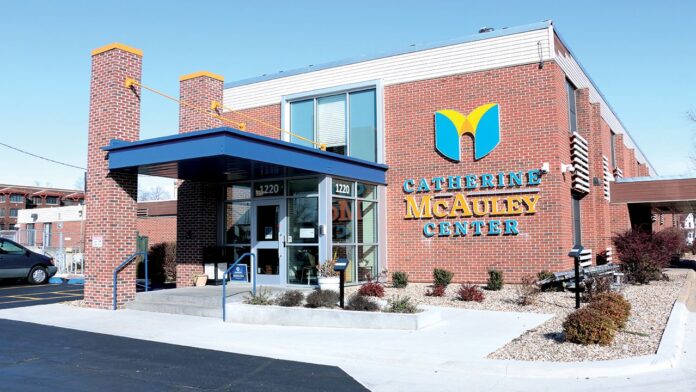
The Trump administration’s decision to halt funding for refugee resettlement programs nationwide has led the Catherine McAuley Center to lay off nearly half its workforce, and the center’s executive director says the loss will be felt on a personal as well as a professional level.
“These aren’t our families, but they feel like family,’ said Catherine McAuley Center executive director Anne Dugger. “These are friends. These are people that we’ve helped regain a sense of freedom and peace here in the United States. So we’re feeling that loss hugely.”
According to reports from Reuters and other news organizations, the State Department announced a suspension of federal funding Jan. 24 for groups that assist refugees and immigrants with housing, job placement and other resettlement needs as part of a broad pause on aid.
For the Catherine McAuley Center, that news came in the form of a Jan. 24 notification that the CMC’s Refugee and Immigrant Services (RIF) program was “no longer going to happen,” Ms. Dugger said.

“We had the (following) weekend to figure out what we were going to do,” Ms. Dugger said. “We had families that we had brought in in January that were told they’d have 90 days of service. That was all cut.”
Since late January, 18 of the CMC’s 44 employees have been laid off, with a number of those layoffs taking effect as of Feb. 3. Another four employees may be laid off in the coming weeks, Ms. Dugger said.
“We have had to cut our Refugee and Immigrant Services down to essentially one and a half people, so we can continue to do some cleanup services and make sure everybody’s got housing and got jobs and can be a part of the community,” she said. “And then we’ve had to cut some of our admin staff and some of our education staff as well, because they were all funded by these programs.”
While a number of refugee and immigrant programs are being cut, including long-term intensive case management, Ms. Dugger said education services will continue to be provided.
“We have always helped that population of people learning English, getting their citizenship, doing as much as we can for them,” Ms. Dugger said.
The CMC’s women’s services will also continue for the foreseeable future, Ms. Dugger said, including sheltering, since those programs are largely funded by a combination of private and state grants.
“We will absolutely do as much as we can with the staff that we have,” she said. “Education Services has always been sort of a place for resource navigation for immigrants and refugees. Our staff is really committed to making sure that if there’s a problem, if there’s anything we can do (we will do it. But what we won’t be able to do, which is what we have been able to do, is help with some of the funding we provide. And because the reception and placement program was cut so fast, we are committed to making sure that the money that people we brought in would get normally, we’re committed to making sure they get that paid out. We just won’t be reimbursed for that.”
That funding has traditionally helped refugees and immigrants with initial expenses, including food, rent, utility payments, furniture and household supplies.
The Catherine McAuley Center provided services to 377 refugees and immigrants in 2024, and plans called for another 250 clients this year, Ms. Dugger said.
“We had, I believe, up to 90 individuals that we had brought in since October,” she said. “And about 30 of those are really, really impacted by this.”
With the loss of funding, CMC employees have been working diligently to help their refugee and immigrant clients find services through other community programs, and in many cases, Ms. Dugger said, employees that were laid off – and others who resigned voluntarily, hoping to save their peers’ jobs – have continued their work at CMC as volunteers.
“The staff has been unbelievable,” she said. “In the last week, they’ve applied for every bit of assistance they can. Through all the programs, they have done paperwork for 186 individuals, gotten people squared away on housing, to do moves, to get people out of temporary housing, just to be sure that they’re okay for the time being.”
But for those CMC clients most impacted by the cuts, the future is uncertain, Ms. Dugger noted.
“It makes people who didn’t really have a country feel so scared and so worried about their position here,” she said. “These people are contributing, they’re part of our community. That’s the thing that’s really heartbreaking to us. We can offer that place of safety for them going forward, of course, and help them as much as we can.”
Despite the latest challenges, Ms. Dugger – a longtime CMC employee who was just named executive director in mid-January – said she remains optimistic that some of the programs may be revived in the future.
“This is an important place in our community,” she said. “It’s been here for 35 years, so it certainly started well before I did. I am just resolved that we will continue the work. We’re taking a blow, but it’s not something we can’t get through. This staff is totally committed to being here for each other. We’re still here, and we’re going to keep helping the people we’ve been helping all along. So I’m holding on to that.”




